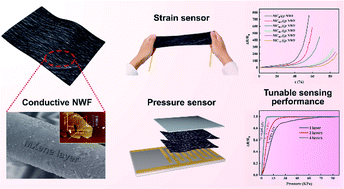Flexible conductive MXene/cellulose nanocrystal coated nonwoven fabrics for tunable wearable strain/pressure sensors†
Abstract
With the rapid development of artificial intelligence, high-performance flexible strain/pressure sensors with excellent wearing comfortability are in urgent demand. In this study, a flexible conductive MXene/cellulose nanocrystal (CNC) coated thermoplastic polyurethane (TPU) non-woven fabric (NWF) was fabricated via a simple dip-coating technique for the fabrication of wearable strain/pressure sensors. Especially, a pre-stretching treatment was applied to the conductive NWF to prepare strain sensors with a special micro-crack structure based on the modulus deviation between the rigid conductive layer and elastic TPU matrix, and controllable crack density was constructed through changing the CNC loading of the conductive layer. As a result, wearable strain sensors with a tunable sensitivity and working range were successfully obtained based on the sensor's crack density, and the MC0.6@p-NWF based strain sensor displays a broad sensing range of 83%, high sensitivity (GF = 3405) and an ultralow detection limit (0.1%) based on the opening/closing of micro-cracks. Furthermore, a tunable wearable pressure sensor was also designed by simply stacking the sensing conductive NWF layers together, and higher sensitivity was achieved for the sensor with more sensing layers, which is mainly ascribed to the more contact area change in the interface between adjacent NWF layers upon compression. More importantly, the conductive NWF based strain/pressure sensors displayed stable sensing behaviors towards various strain/frequency levels, short response/recovery time and excellent long-term sensing stability. As expected, they can be successfully applied in various applications, ranging from real-time full-range human body motion monitoring (e.g. finger, wrist movement), human physical signal collection (e.g. pulse, swallowing and respiration) and flexible artificial electronic skin (E-skin). Our study provides an effective strategy for the fabrication of wearable strain/pressure sensors with desirable comprehensive performance in the field of artificial intelligence.



 Please wait while we load your content...
Please wait while we load your content...